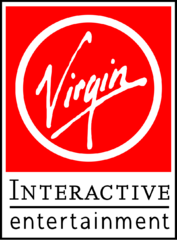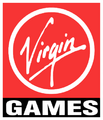Difference between revisions of "Virgin Interactive Entertainment"
From Sega Retro
| Line 74: | Line 74: | ||
* ''[[Spot Goes to Hollywood]]'' (1995) | * ''[[Spot Goes to Hollywood]]'' (1995) | ||
* ''[[Wacky Races (Mega Drive)|Wacky Races]]'' (unpublished) | * ''[[Wacky Races (Mega Drive)|Wacky Races]]'' (unpublished) | ||
| − | |||
| − | |||
| − | |||
| − | |||
| − | |||
| − | |||
| − | |||
| − | |||
| − | |||
===[[Game Gear]]=== | ===[[Game Gear]]=== | ||
| Line 94: | Line 85: | ||
* ''[[Dragon: The Bruce Lee Story]]'' (1994) | * ''[[Dragon: The Bruce Lee Story]]'' (1994) | ||
* ''[[The Lion King]]'' (1994) | * ''[[The Lion King]]'' (1994) | ||
| + | |||
| + | ===[[Mega-CD]]=== | ||
| + | * ''[[Chuck Rock II: Son of Chuck]]'' (1993) | ||
| + | * ''[[Dune]]'' (1993) | ||
| + | * ''[[The Terminator]]'' (1993) | ||
| + | * ''[[Heart of the Alien: Out of This World Parts I and II]]'' (1994) | ||
| + | * ''[[Links: The Challenge of Golf]]'' (1994) | ||
| + | * ''[[Trivial Pursuit Interactive Multimedia Game]]'' (1994) | ||
| + | * ''[[Demolition Man]]'' (1995) | ||
| + | |||
| + | ===[[32X]]=== | ||
| + | * ''[[Pinocchio]]'' (unpublished) | ||
| + | * ''[[Spot Goes to Hollywood]]'' (unpublished) | ||
===[[Saturn]]=== | ===[[Saturn]]=== | ||
Revision as of 12:28, 1 February 2019

| ||
| Virgin Interactive Entertainment | ||
|---|---|---|
| Founded: 1983[1] | ||
| T-series code: T-70 | ||
| Merged into: Titus (UK division), EA (US division) | ||
Headquarters:
|
Virgin Interactive was a British video game developer and publisher. Founded in 1983[1] as Virgin Games Ltd., it was the Virgin Group's first foray into the video game market.
Contents
History
In its initial form, Virgin Games, like many British video game companies of the day, developed and published video games for home computer platforms, such as the ZX Spectrum and Commodore 64.
In 1987, Virgin Games bought a minority stake in budget label cash-strapped Mastertronic, as Virgin Games wanted to be in the budget computer games business[1]. Mastertronic, set to be the official distributor of the Sega Master System in the UK, suffered a setback after Sega delivered the first order of consoles too late, leading to Virgin Games acquiring the company in full later in the year, creating Virgin Mastertronic, Ltd. in the process[1].
Virgin Mastertronic, essentially given free reign over Sega's products after they left Japan, was extremely successful at marketing the Master System in the region. It was given control over France and Germany in mid-1988[1], later taking on the launch of the Sega Mega Drive in 1990.
Seeing its success, Sega acquired the publishing arm of Virgin Mastertronic in 1991, turning it into Sega Europe[1]. The development arm, which Sega was not interested in, returned to its original name as Virgin Games. Over the next few years, Virgin Games would see a string of successes, the most notable of which being the hand-animated Disney's Aladdin which redefined computer animation in games.
1993 saw the company rename itself as Virgin Interactive Entertainment. During this period it capitalised on the work of Westwood Studios, among others. Virgin Interactive would transition more towards a publishing and distribution company in the years which followed. In late 1995 it acquired the distribution rights for Capcom titles in Europe[2].
The British studio operations were acquired in a management buyout led by former Managing Director Tim Chaney in 1998. The U.S. operations were sold to Electronic Arts as part of its acquisition of Westwood Studios that same year. The company's assets were acquired in 1999 by the French publisher Titus Software, with its name being changed to Avalon Interactive on July 1, 2003.
In May 2002, the Spanish division of Virgin Interactive, known as Virgin Interactive España, was purchased by Tim Chaney along with former Spanish president and founder Paco Encinas. The branch was then separated from the main Virgin Interactive company, already part of Titus Software, and kept its own identity as a Virgin brand. Renamed Virgin Play in October 2002, this Spanish publisher remained as the sole representation of the Virgin Group in the video game industry until it filed for liquidation in 2009. Virgin Play distributed the PSP version of Puyo Pop Fever in the spanish market.
Softography
Master System
- Speedball (1990)
- Speedball 2: Brutal Deluxe (1991)
- Xenon 2: Megablast (1991)
- Chuck Rock (1992)
- Marble Madness (1992)
- Super Off Road (1992)
- Mick & Mack as the Global Gladiators (1993)
- Wolfchild (1993)
- Cool Spot (1993)
- The Jungle Book (1993)
- RoboCop Versus The Terminator (1994)
- Dragon: The Bruce Lee Story (1994)
- The Lion King (1994)
- Fire & Ice (1995)
- Battletoads in Battlemaniacs (1996)
Mega Drive
- Xenon 2: Megablast (1990)
- Chuck Rock (1991)
- Cyber-Cop (1992)
- Mega lo Mania (1992)
- Muhammad Ali Heavyweight Boxing (1992)
- Out of This World (1992)
- The Terminator (1992)
- European Club Soccer (1992)
- World Trophy Soccer (1992)
- Disney's Aladdin (1993)
- Caesars Palace (1993)
- Chi Chi's Pro Challenge Golf (1993)
- Chuck Rock II: Son of Chuck (1993)
- Cool Spot (1993)
- Mick & Mack as the Global Gladiators (1993)
- RoboCop Versus The Terminator (1993)
- Two Tribes: Populous II (1993)
- Dune: The Battle for Arrakis (1994)
- Jammit (1994)
- Jimmy White's Whirlwind Snooker (1994)
- The Jungle Book (1994)
- Dragon: The Bruce Lee Story (1994)
- The Lion King (1994)
- Earthworm Jim 2 (1995)
- Flux (1995)
- Pinocchio (1995)
- Spot Goes to Hollywood (1995)
- Wacky Races (unpublished)
Game Gear
- Super Off Road (1992)
- Chuck Rock II: Son of Chuck (1993)
- Mick & Mack as the Global Gladiators (1993)
- Wolfchild (1993)
- Cool Spot (1993)
- The Jungle Book (1994)
- RoboCop Versus The Terminator (1994)
- Dragon: The Bruce Lee Story (1994)
- The Lion King (1994)
Mega-CD
- Chuck Rock II: Son of Chuck (1993)
- Dune (1993)
- The Terminator (1993)
- Heart of the Alien: Out of This World Parts I and II (1994)
- Links: The Challenge of Golf (1994)
- Trivial Pursuit Interactive Multimedia Game (1994)
- Demolition Man (1995)
32X
- Pinocchio (unpublished)
- Spot Goes to Hollywood (unpublished)
Saturn
- Chaos Control (1995, Japanese publishing rights only)
- Black Fire (1995, Japanese and European publishing rights only)
- Black Dawn (1996)
- Earthworm Jim 2 (1996, European Publishing Rights only)
- F1 Challenge (1996, North American distribution only)
- Grid Runner (1996)
- hyper 3-D Pinball (1996)
- Ryougae Puzzle Game Moudjiya (1996, Japan Only)
- Spot Goes to Hollywood (1997)
- Crimewave (1997, Japanese Publishing Rights Only)
- Grand Slam (1997, North America Only)
- NHL Powerplay '96 (1997)
Saturn (Capcom Titles Europe)
- Street Fighter Alpha: Warriors' Dreams (1996)
- Night Warriors: Darkstalkers' Revenge (1996)
- Mega Man X3 (1996)
- Street Fighter Alpha 2 (1996)
- Super Puzzle Fighter II Turbo (1996)
- Marvel Super Heroes (1997)
- Street Fighter Collection (1998, not mentioned on packaging)
Dreamcast
- MDK 2 (2000, European distribution only)
- Super Runabout: San Francisco Edition (2000, Europe only)
- Jimmy White's 2: Cueball (2000)
- Mr. Driller (2000, Europe Only)
- Caesars Palace 2000: Millennium Gold Edition (2000, European distribution only)
- Bangai-O (2000, European distribution only)
- Dragon's Blood (2000, European distribution only)
- Kao the Kangaroo (2000, European distribution only)
- European Super League (2001)
- Exhibition of Speed (2001, European distribution only)
- Worms World Party (2001, European distribution only)
Dreamcast (Capcom Titles Europe)
- Marvel vs. Capcom: Clash of Super Heroes (1999)
- Street Fighter Alpha 3 (1999)
- Giga Wing (1999)
- JoJo's Bizarre Adventure (1999)
- Plasma Sword: Nightmare of Bilstein (1999)
- Street Fighter III: Double Impact (1999)
- Resident Evil 2 (1999)
- Tech Romancer (2000)
- Gunbird 2 (2000)
- Marvel vs. Capcom 2: New Age of Heroes (2000)
- Street Fighter III: 3rd Strike (2000)
- Capcom vs. SNK: Millennium Fight 2000 (2000)
- Dino Crisis (2000)
- Resident Evil 3: Nemesis (2000)
- Project Justice (2000)
Promotional material
Gallery
References
NEC Retro has more information related to Virgin Interactive Entertainment
|





